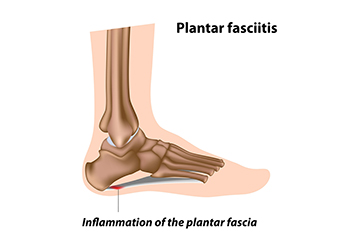
Patients who have developed plantar fasciitis often look to find relief. It is a condition that is characterized by heel pain, and it may affect the Achilles tendon. Plantar fasciitis is an inflammation of the plantar fascia, which is the band of tissue that connects the heels to the toes. It is located on the soles of the feet, and can happen from standing on hard surfaces for the majority of the day. Additionally, wearing shoes that do not have adequate support may contribute significantly to getting plantar fasciitis. Many people choose to ignore the aches that this condition often begins with, and this may extend the recovery period. There are simple stretching techniques that may help to reduce the pain from plantar fasciitis. A stretch for the plantar fascia is done by rolling the affected foot on a tennis ball or frozen water bottle. A standing heel raise is also an effective stretch. This is accomplished by standing on a step, while lowering heels one at a time until a gentle stretch is felt. Plantar fasciitis is a serious foot condition, and it is suggested that you are under the care of a podiatrist who can help you with effective relief methods.
Plantar fasciitis is a common foot condition that is often caused by a strain injury. If you are experiencing heel pain or symptoms of plantar fasciitis, contact one of our podiatrists from Fusion Foot and Ankle. Our doctors can provide the care you need to keep you pain-free and on your feet.
What Is Plantar Fasciitis?
Plantar fasciitis is one of the most common causes of heel pain. The plantar fascia is a ligament that connects your heel to the front of your foot. When this ligament becomes inflamed, plantar fasciitis is the result. If you have plantar fasciitis you will have a stabbing pain that usually occurs with your first steps in the morning. As the day progresses and you walk around more, this pain will start to disappear, but it will return after long periods of standing or sitting.
What Causes Plantar Fasciitis?
- Excessive running
- Having high arches in your feet
- Other foot issues such as flat feet
- Pregnancy (due to the sudden weight gain)
- Being on your feet very often
There are some risk factors that may make you more likely to develop plantar fasciitis compared to others. The condition most commonly affects adults between the ages of 40 and 60. It also tends to affect people who are obese because the extra pounds result in extra stress being placed on the plantar fascia.
Prevention
- Take good care of your feet – Wear shoes that have good arch support and heel cushioning.
- Maintain a healthy weight
- If you are a runner, alternate running with other sports that won’t cause heel pain
There are a variety of treatment options available for plantar fasciitis along with the pain that accompanies it. Additionally, physical therapy is a very important component in the treatment process. It is important that you meet with your podiatrist to determine which treatment option is best for you.
If you have any questions, please feel free to contact our offices located in Fort Worth and Arlington, TX . We offer the newest diagnostic and treatment technologies for all your foot care needs.


